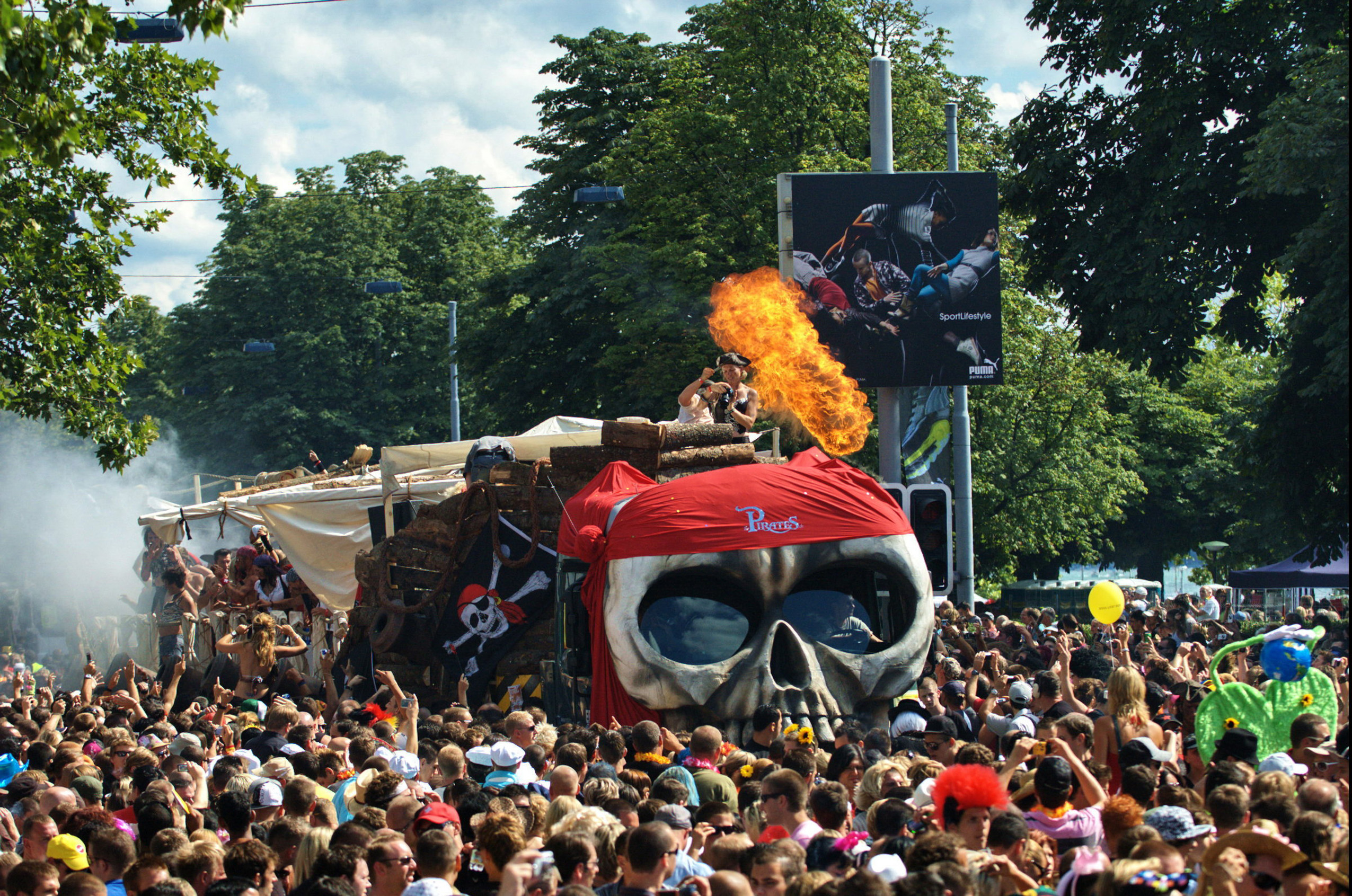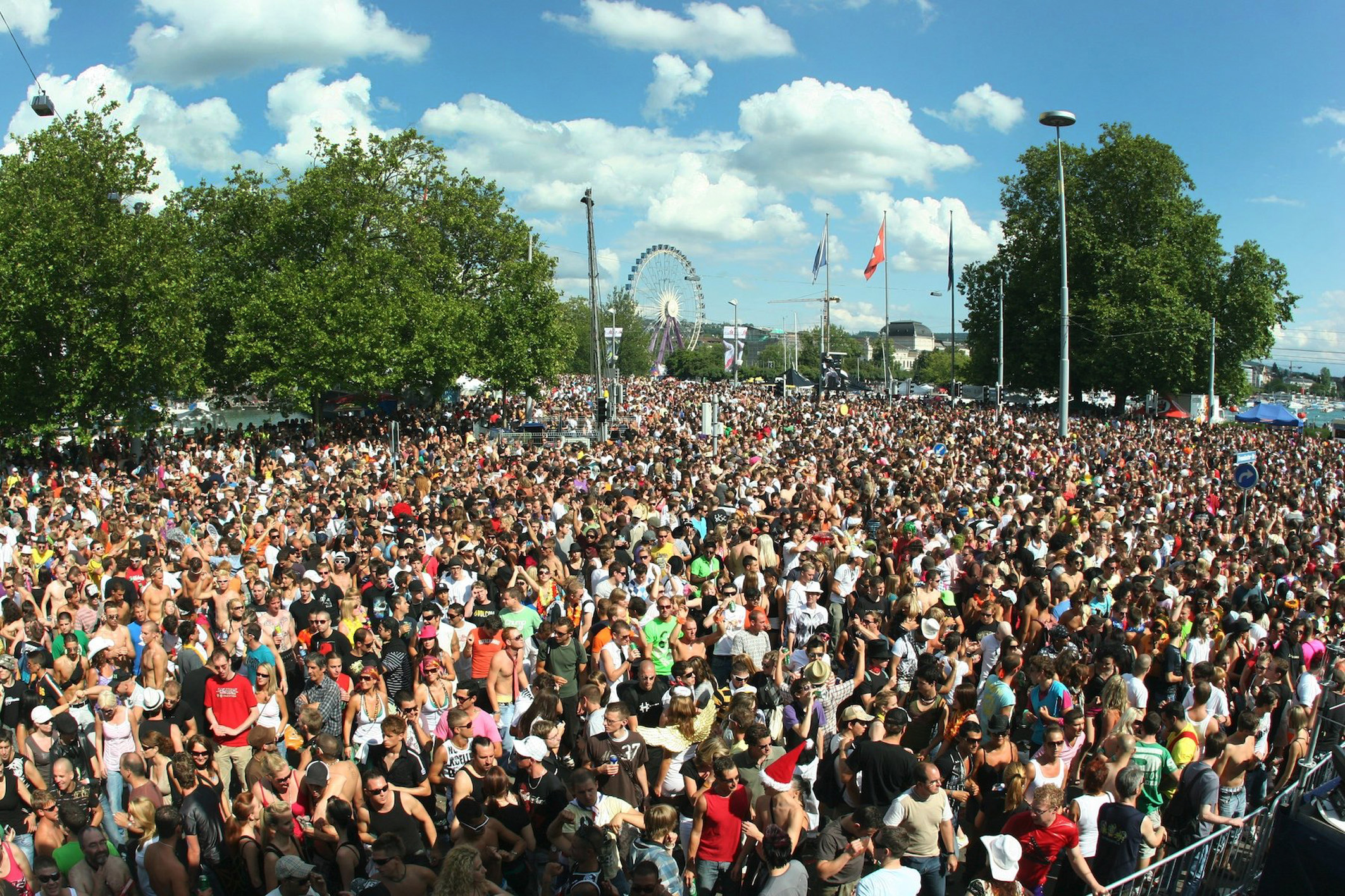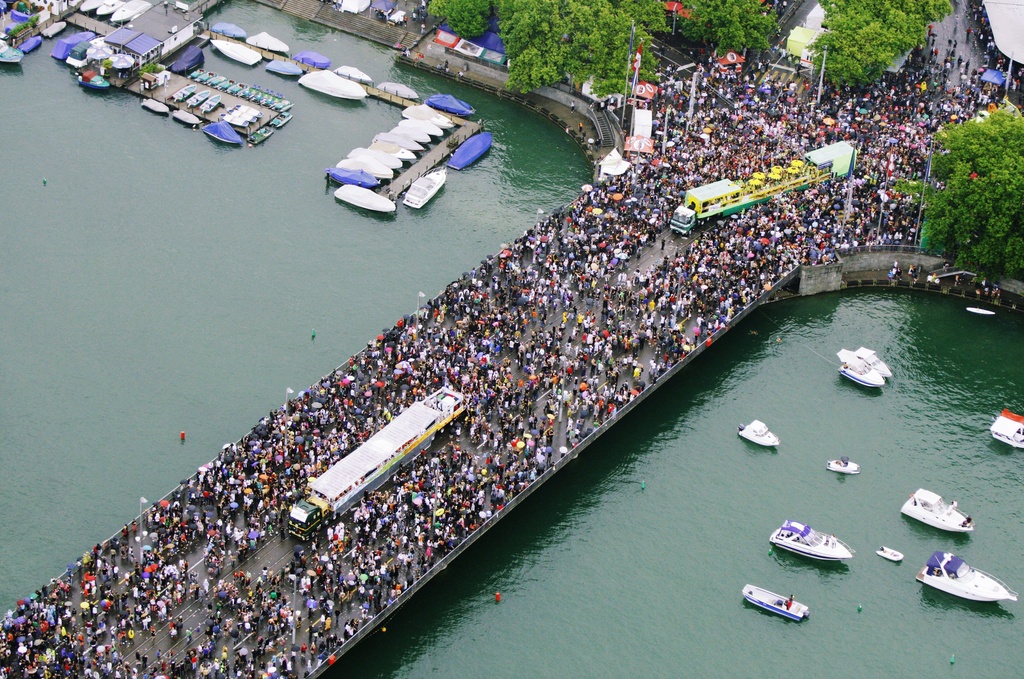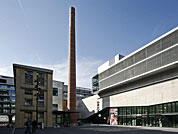How the Street Parade shook up Zurich

The Street Parade, which celebrates its 20th jubilee on Saturday, caused quite a stir in the normally staid financial centre of Zurich when it started in 1992.
Since then it has survived an attempt to have it banned, bad weather, criticism over drugs – and the changing times.
Up to 900,000 people are expected in the Limmat city for this year’s parade, which is taking place under the motto: “20 years Love, Freedom, Tolerance and Respect”.
There will be 29 “love mobiles” as well as six huge static stages. Dancing along in the first float, which is devoted to the jubilee, will be Marek Krynski, who, as a young mathematics student, was the driving force behind the first parade.
“In the middle of the 1980s Zurich was really boring in terms of nightlife,” Krynski told swissinfo.ch. Then Acid House arrived and Zurich was hit by a youth “rave-olution”.
Krynski formed his parade idea after seeing a television report on the Love Parade in Berlin.
“I went to the next Love Parade to see whether it was really as good as I thought – and it was even better,” he said. “I knew then that I would organise the Zurich Street Parade. The rest is history.”
The event received the go-ahead and – despite scepticism in many quarters that scantily clad ravers would actually bop to music in broad daylight in Zurich – the parade opened in 1992 with 1,000 partygoers and six floats.
“Too big, too loud…”
The following year the parade attracted 10,000 people. But not everyone liked it: in 1994, the police chief tried to ban the event on the grounds that it was “too big, too loud, litters the streets of the city and moreover is only of interest to an insignificant section of the population”.
An outcry from politicians and the public followed. The Street Parade was saved.
Krynski left the organising committee in 1996 but the event continued. By 2000-2001, the highpoint of the parade, one million people were taking part.
In recent years, however, the parade has suffered from bad weather: in 2009 the emergency services had to treat cases of acute hypothermia because of soaked clothing or too scanty costumes. Last year the parade held a minute’s silence for the victims of the Love Parade stampede in the German city of Duisburg, in which 21 people died.
Krynski, who works in risk management at a big Swiss bank and is now a father, has attended every parade.
For him, the secret of the Street Parade’s success – apart from it being free – is that techno and house music foster happiness.
“This sense of happiness grows when it’s shared and the Street Parade is the best way of sharing this happiness,” he said.
Changes with times
The parade’s spokesman, Stefan Epli, added that the event’s success could be seen in the fact that attendance had stayed constant in recent years at 600,000-800,000.
“The media always say it’s over, it’s the last Street Parade, people don’t want it anymore. But people want it because it’s not a traditional event,” Epli said. “The Street Parade reflects the times and changes with the times.”
Indeed, although it’s the 20th anniversary, this year’s focus will be on the present, he said, with upcoming names like the German band Boy Noize.
For the Zurich authorities, the Street Parade is also an important event.
“For thousands of young people it’s a weekend when Zurich is at its best: taking place at the lake and mostly with good weather. The Street Parade is therefore good for Zurich’s image abroad as a young, lively city,” said Brigit Wehrli-Schindler, head of urban development.
Criticism and future
There has, however, been criticism that there is too much drink and drugs at the parade, something which Epli strongly counters.
The message from the organisers is that a bit of alcohol is acceptable – beer only is on sale – but absolutely no drugs.
“We say that people must take the initiative to get themselves under control. But basically, for an event of this size, it’s only a few people who have problems,” Epli told swissinfo.ch.
Security was reviewed last year in the wake of the Duisburg disaster, with the emphasis on keeping escape routes open.
This year the organisers are hoping for a harmonious parade, which can enjoy the current boom in electronic music.
And the future? “We hope that the Street Parade continues as it has for the past 20 years,” Epli said.
20th Street Parade on August 13.
Distance: 2 km from the Utoquai to Hafendamm Enge
Love mobiles: 29; large stages: 7; participants: 600,000-800,000, of which 20% from Germany
Names: on the jubilee mobile: Marek Krynski alias Partyman as DJ, also Dr Motte, founder of Love Parade in Berlin. Also attending the parade: DJ Carl Cox.
Cost: SFr1.7 million ($2.2 million) of which 25% on PR and information and 75% on safety, sanitary facilities, organisation. Money comes from sponsors, as well as catering and CD sales. Organiser the Street Parade Association is a non-profit organisation.
Local turnover: has been estimated at SFr120 million, according to the Street Parade.
The Love Parade in Germany was considered the “Mother of all Love Parades”. It was originally held in Berlin before it moved to the Ruhr region near the Dutch border.
A stampede at the 2010 event on July 24 in Duisburg killed 21 people and injured 500. As result the organisers of the festival announced no further Love Parades would be held.
The exact cause of the stampede has not yet been established, although there was criticism of the mayor and event organisers for failing to adequately plan for the event and for having too many revellers present. A criminal investigation is ongoing.

In compliance with the JTI standards
More: SWI swissinfo.ch certified by the Journalism Trust Initiative





You can find an overview of ongoing debates with our journalists here. Please join us!
If you want to start a conversation about a topic raised in this article or want to report factual errors, email us at english@swissinfo.ch.